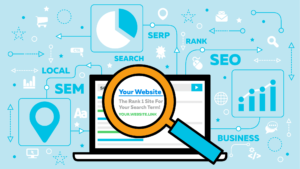[ad_1]
You’ve optimized your website for search. You’re getting lots of high-quality traffic.
But despite the uptick in visitors, your sales and leads remain lackluster.
It’s a frustrating situation.
The good news? There are strategies you can implement to convert that traffic into paying customers.
This article explores nine proven methods to help you turn SEO traffic into sales and leads.
1. Improve your site’s user experience (UX)
UX and SEO have been talked about for years and are intrinsically linked, but many sites still haven’t spent time improving UX.
Here are some key areas to focus on:
- Use white space to declutter your pages.
- Add in call-to-actions that stand out.
- Focus on your page speed – slow sites lose 90% of leads.
- Use responsive design to adapt to all devices.
- Keep your layout consistent.
- Reduce 404 errors.
You can, and should, test your site’s user experience from an unbiased source. You might know the nuances of your site and sales funnel, but your users do not.
Test, refine and test again. Over time, you’ll need to revisit your tests as visitor behavior changes.
2. Optimize for conversions
You have traffic, and it’s time to make sales. What is your conversion rate (CVR)? If you’re an ecommerce site with a 2.3% or higher CVR, you’re actually doing really well.
Optimizing this metric will require you to review key sections of your site:
- Blog: Your blog may be a traffic magnet, but let’s turn those visitors into sales. Add call-to-actions in your article, create clear banners for products or services and push your product or service as a solution to the visitor’s pain points.
- Landing pages: If your landing pages aren’t converting, begin A/B testing them. You can add new CTAs, change the layout and copy – anything you can – to entice visitors to take action.
- Copy: If traffic is leading to product or service pages, it may be that your copy is not clear and concise. You’ll want to work with a copywriter to optimize and test these pages until conversions rise.
If your pages aren’t optimized for conversions, it can easily lead to SEO traffic that simply isn’t converting.
3. Optimize the first two actions on content pages that don’t target the right keywords
Are you leveraging the value of educational content? You should:
- Focus on the first two actions on the blog.
- Update the highest traffic pages as a test.
For example, you can add a “Demo” button to the top of the blog post with a strong call to action or provide a demo video above the fold.
Transforming traffic into sales is possible with educational content, and it may be as easy as focusing on these two actions on your pages.
4. Improve content quality and relevance
Older businesses tend to have hundreds of blog posts that they never review or update.
What was considered relevant and quality content in the past may not be today.
You’ll want to take an inventory of your articles, starting with those that get the most traffic, and start working through them with an audit.
- Does the article have the quality that you want from your business?
- Is the article relevant to the visitors who are landing on your page?
If you purge older content, try finding redirect opportunities to other content assets that may be higher quality yet still relevant.
Dig deeper: Improving or removing content for SEO: How to do it the right way
Get the daily newsletter search marketers rely on.
5. Analyze and utilize data to improve sales
Data is only useful if you analyze it and use it to improve sales. You may have multiple forms of data to sift through:
- Analytics
- Server logs
- Heatmaps
If you begin sifting through server logs and see an uptick in 404 errors on your checkout page, you have the reason for your poor conversions. You need to dig into these issues.
For example, if you have a heatmap on your site, you may find that everyone is looking at the right side of the page, but you have a CTA on the left side.
Use this rich data to find where visitors are getting “stuck” in your sales funnel and begin making changes to address these issues.
6. Boost trust and credibility outside of social proof
Social proof is huge (more on that below), but what other things can you do to improve trust and credibility? You can:
- Add your professional license number.
- Post your clear warranty or guarantee information.
- Add logos or information about professional memberships or associations.
- Publish your awards.
- Add links to news articles or publications where you’ve been published.
Every industry has its own way to improve trust and credibility. A law firm can showcase their bar association, awards, settlements and other data showing that they’re a business people trust.
7. Focus on local SEO (when applicable)
Brick-and-mortar businesses may see sales and leads dwindle due to a lack of focus on local SEO.
Local SEO takes a more strategic and targeted approach to help businesses improve their visibility in Google’s local search results.
For example, a website for a sushi restaurant in Los Angeles that focuses on broad keywords (e.g., “sushi restaurant” or “sushi restaurants in California”) may struggle to:
- Rank in the search results because the competition is so high.
- Reach the right people.
That restaurant would be better off focusing on keywords like “sushi restaurant in LA” or even “sushi restaurant in Glendale.” These keywords may be easier to rank for and would put their site in front of their target audience.
Other ways to improve local SEO:
- Optimizing your Google Business Profile page.
- Ensuring your NAP information is consistent online.
- Optimizing content and pages for location-based keywords.
Local SEO can help ensure that when local customers search for your business, they find your site.
Dig deeper: Local SEO for new physical locations
8. Leverage A/B testing to maximize conversions
A/B testing can be an effective tool for conversion rate optimization (CRO). The goal is to test two versions of a webpage to see which one generates a higher conversion rate.
A simple change to your copy or even changing the color of a button can significantly impact conversions.
Through A/B testing, you can experiment with different variations of your pages, choose the best-performing version and maximize your conversions.
Even a well-optimized site can fail to convert if the layout, copy, formatting, and design are ineffective.
An SEO specialist can help you:
- Identify which page elements to test (e.g., headlines, CTA buttons, copy, layout, etc.).
- Create variants of your pages.
- Run the test.
- Measure and analyze the results.
A/B testing can be used continually to improve your conversion rates over time.
9. Enhance social proof to build trust and credibility
Consumers need more than just persuasive copy to convince them to purchase. Up to 87% of buying decisions start with online research, and 88% of consumers trust reviews as much as personal recommendations.
If your sales are suffering but your SEO is on-point, you may not be delivering the social proof prospects need to convert.
To build trust and credibility, showcase your:
- Reviews: Embed them on product pages and highlight positive reviews on your homepage.
- Testimonials: Showcase these prominently on your landing pages. Include photos, videos and names for each testimonial.
- Awards and recognition: Add award badges to your pages to let prospects know that industry experts and associations trust your business.
- Case studies: Add these to your site to show prospects the results you’ve delivered for other customers or clients.
- Influencer endorsements: Highlight celebrity or influencer endorsements. Their opinions can easily sway prospects.
An SEO specialist can help ensure your social proof is optimized and displayed prominently on your page.
Work cross-teams to adjust your sales funnel
SEO can drive traffic to your site, but once a prospect lands on your page, it’s up to your content and UX to convert them.
Optimize content for each stage of your sales funnel.
Great SEO doesn’t automatically translate to higher sales and conversions.
Even with great SEO, sales and leads can suffer if the other puzzle pieces aren’t in place. The above strategies can help improve your conversion rates.
Opinions expressed in this article are those of the guest author and not necessarily Search Engine Land. Staff authors are listed here.
[ad_2]





